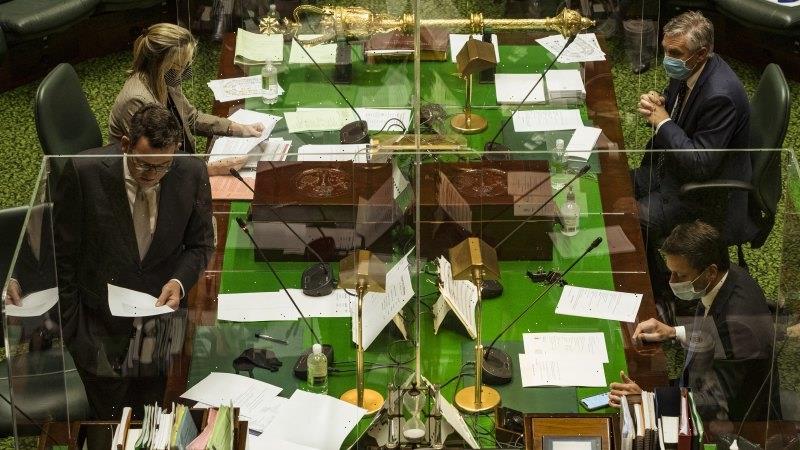For our free coronavirus pandemic coverage, learn more here.
In pre-pandemic days, if you had questioned whether, outside of war, the state government could severely restrict the individual liberties of all Victorians, it’s likely most people would have been surprised by the extent of what it could do. There would be no doubts today.
Since March 16 last year, when a state of emergency was first declared under the Public Health and Wellbeing Act, Victoria’s Chief Health Officer, Brett Sutton, has exercised enormous powers over all our lives. While there have been sporadic outbreaks of protest, sometimes violent, over the level of restrictions, most Victorians have largely accepted the need to put the health and wellbeing of the wider community before our individual liberties and freedom of movement.
The Victorian government’s pandemic laws passed the lower house on Thursday. Credit:Chris Hopkins
To a large degree, it has been this acceptance of forgoing our individual rights for the greater good that contributed to the state’s success in containing the coronavirus and limiting the death toll. But that is not to say the mechanics of how those powers have been exercised have always been ideal.
The Age has previously raised concerns about the lack of transparency, and the draconian measures used to lock down in July last year nine public housing towers in North Melbourne and Flemington with no warning were widely condemned. There were also, at times, concerns raised about the degree of authority given to the chief health officer, an unelected official who has never been required to release his advice to the government publicly.
The challenges in finding the right balance between ensuring the state has enough powers to enforce adequate public health measures while maintaining enough transparency and accountability were raised this week when the state government made public, and passed in the lower house, new proposed permanent laws specific to pandemics to replace the state of emergency powers that expire on December 15.
The most substantial change was the downgrading of the chief health officer’s role, with the power to sign off on pandemic orders being handed to the health minister. Other changes included the premier being given the power to declare a pandemic, eliminating the maximum time for such powers, increasing the penalties for breaches, enshrining privacy over collected information and creating an independent pandemic management advisory committee to oversee the pandemic orders.
The changes have been met with mixed reviews. While some have applauded the commitment to better transparency and enhanced security of private information, there are strong concerns about the lack of oversight, with good reason.
Under the new laws, the health minister will sign off on an order after receiving advice from the chief health officer (which will be made public), but such orders are only to be scrutinised by a new advisory body selected by the government, and not a cross-party parliamentary committee. In an open letter opposing the new laws, top lawyers say they will give politicians “a blank cheque to rule by decree” and run counter to basic democratic principles.
There has been hyperbolic and partisan criticism of these laws, but the substantial criticism needs to be taken seriously. Why, for instance, should the health minister be able to make any order he or she believes to be “reasonably necessary to protect public health”? That is too open-ended and there is all but no avenue for appeal.
Why should authorised officers – necessary, but unelected – have such extraordinary powers to “take any action or give any direction” they deem necessary to protect public health? Why is there not substantial parliamentary oversight for laws that by necessity severely restrict people’s rights and liberties?
These laws have many good elements, but too many flaws to pass without amendment.
Fascinating answers to perplexing questions delivered to your inbox every week. Sign up to get our new Explainer newsletter here.
Most Viewed in Politics
From our partners
Source: Read Full Article

